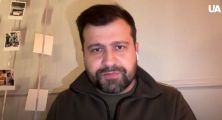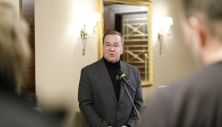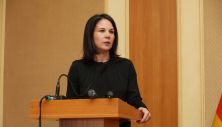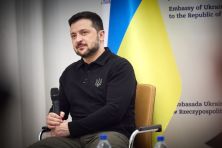German Defense Minister Boris Pistorius believes the German military could take part in ensuring the security of the demilitarized zone in Ukraine...
Vous n'êtes pas connecté
- English
- Français
- عربي
- Español
- Deutsch
- Português
- русский язык
- Català
- Italiano
- Nederlands, Vlaams
- Norsk
- فارسی
- বাংলা
- اردو
- Azərbaycan dili
- Bahasa Indonesia
- Հայերեն
- Ελληνικά
- Bosanski jezik
- українська мова
- Íslenska
- Türkmen, Түркмен
- Türkçe
- Shqip
- Eesti keel
- magyar
- Қазақ тілі
- Kalaallisut ; kalaallit oqaasii
- Lietuvių kalba
- Latviešu valoda
- македонски јазик
- Монгол
- Bahasa Melayu ; بهاس ملايو
- ဗမာစာ
- Slovenščina
- тоҷикӣ ; toğikī ; تاجیکی
- ไทย
- O'zbek ; Ўзбек ; أۇزبېك
- Tiếng Việt
- ភាសាខ្មែរ
- རྫོང་ཁ
- Soomaaliga ; af Soomaali
Rubriques :
 Maroc - ENG.UATV.UA - A La Une - Hier 10:59
Maroc - ENG.UATV.UA - A La Une - Hier 10:59
Serhyy Sumlenny: Raging populism fuels the far-rights in Germany
Sumlenny worked in Moscow for leading German TV broadcaster ARD - so is ARD broadcasting from Moscow now? Olaf Scholz is looking increasingly pro-russian. Far-rights and populism in Germany - what’s to expect? We discussed that with Sergiy Sumlenny, Eastern Europe politics expert. — You worked in Moscow for a leading German TV broadcaster, ARD. Is ARD broadcasting anything from Moscow these days? — Yes. ARD and German media, in general, still have their offices in Moscow. They continue to broadcast from there. Internally, journalists can still travel to Germany and back to Russia, albeit indirectly, through other destinations like Istanbul in Turkey or other airports. I personally do not understand the value of maintaining such reports from Russia. — Exactly, that’s my point. What is the value of the journalism there? There’s obviously a lot of pressure on these publications. This isn’t ARD as it was before the war—am I correct? — Yes, of course. I worked at ARD’s Moscow office from 2002 until 2005. Even back then, it wasn’t completely unproblematic to travel through Russia. You could be harassed by the FSB, or your media requests could be denied. But still, you could travel and interview people. Now, I don’t see any additional value in having these offices. Most people you would talk to are afraid to say anything. Even if they want to talk, you cannot travel freely through Russia or report on what is really important. For example, I haven’t seen any reports from German media on Russian forced conscription or other practices during this war because doing so could lead to significant trouble. Western journalists who try to investigate sensitive topics get arrested. Some might be exchanged after six months or a year, but it sends a clear signal: if you report on critical issues, you’ll be punished. These German media offices in Moscow seem to remain there more as a tradition and due to competition between media outlets. If one media outlet closes its office, it will be criticized in Germany. People would argue, “Other media are still there—why did you leave Moscow?” — It’s a strange kind of competition, isn’t it? — Yes. It’s almost like staying in Russia as long as it’s possible, until the offices are forcibly closed by the Russian state. This is similar to what happened with German political foundations working in Russia—they operated there for zero purpose. Eventually, they were all closed and had to leave. Perhaps ARD is waiting for dramatic footage of their offices being forcibly closed by the FSB, so they can turn it into a big story. — That’s interesting. The reason I asked is that I wanted to shift the discussion to Olaf Scholz. ARD is one thing, but Scholz, with his “no way” stance on 2% NATO expenditures, appears not just pro-Russian but strange—maybe even out of touch. How popular do you think Scholz and his policies are among Germans these days? — If you look at the polls, the SPD (Social Democratic Party) has about 15% support. That’s the lowest level in its history. Scholz is one of the least popular German politicians and the least popular Chancellor since the founding of the Federal Republic of Germany in 1949. Still, Scholz tries to maintain his platform of appeasement, what he calls a “balanced” or “special calm” approach. — Why do you think he does that? — I believe he thinks he can’t win by being critical of Russia. Instead, he aims to win the “competition of appeasement.” There are only two other parties in Germany as appeasing toward Russia as Scholz: the far-left Die Linke and the far-right AfD. Scholz likely thinks his message can be: “If you don’t want to support radicals but want peace with Russia—even at Ukraine’s expense—vote for us. We offer a moderate alternative.” The SPD leadership aligns with this stance. Figures like Rolf Mützenich or Manuela Schwesig are even more pro-Russian than Scholz himself. The SPD has a history of such politics, from Gerhard Schröder to Frank-Walter Steinmeier, who had ties to Gazprom. — And what about Friedrich Merz? Who is he, and what should we expect? — Friedrich Merz is the leader of the CDU (Christian Democratic Union) and is most likely the next Chancellor of Germany. Realistically, I don’t see what could stop him unless something completely unpredictable happens. The question isn’t if Merz will become Chancellor but which coalition partner the CDU will choose. — What are the options? — Two options remain. The FDP (liberals) might not pass the 5% threshold to enter parliament, and even if they do, it would be hard for them and the CDU to secure a majority. That leaves two possibilities: a “grand coalition” with the SPD, which Merkel preferred, or a coalition with the Greens. — Which is more likely? — The Greens align with the CDU on security and foreign policy, especially regarding Russia and Ukraine. But they differ sharply on economic, monetary, taxation, energy, migration, and industrial policies. A coalition with the SPD would be easier on domestic issues but risky for Ukraine. The CDU has a pro-Russian faction, which could find common ground with the SPD. Remember, the CDU supported Nord Stream 2 under Merkel. If the CDU partners with the SPD, this pro-Russian element might push for policies that undermine Ukraine. It’s a concerning possibility. https://www.youtube.com/watch?v=q_XgzTsHW10&ab_channel=UATVEnglish Read also: The World Is Watching and Waiting What Trump Will Do. Interview with Ivan Stupak The post Serhyy Sumlenny: Raging populism fuels the far-rights in Germany appeared first on Freedom.
Articles similaires
The World Is Watching and Waiting What Trump Will Do. Interview with Ivan Stupak
The U.S. foreign policy has been reactive rather than proactive for the last 4 years and world leaders expect Trump to change it when he comes into...
Preparing for Russia’s Collapse: Ben Hodges on War Future
In this compelling wrap-up episode, we dive into an exclusive interview with retired Lieutenant General Ben Hodges. He emphasizes the urgent need...
Poland denies Slovak delegation’s plane access to its airspace en route to Russia – media
Polish authorities refused to allow a plane carrying a Slovak parliamentary delegation to fly through their airspace on its way to Russia. That is...
German Foreign Minister: Putin Threatens the Baltic Sea with Rusty Tankers
German Foreign Minister Annalena Baerbock has stated that Russian leader Vladimir Putin poses a threat to the Baltic Sea by using a "shadow fleet"...
Circassian National Movement Energized By Kyiv’s Recognition Of Russian Genocide – Analysis
On January 9, Ukraine’s Verkhovna Rada voted overwhelmingly for a resolution declaring that Russian actions during and at the end of the Russian...
Blurring Conventional–Nuclear Boundaries: Nordic Developments, Global Implications – Analysis
By Dr Wilfred Wan and Dr Gitte du Plessis In July 2024 Norway’s Kongsberg Defence & Aerospace signed a contract with the Norwegian Defence...
Zelenskyy Explains Why Security Guarantees Are Critical for Ukraine Before “Stopping the War”
Ukrainian President Volodymyr Zelenskyy emphasized that for Ukraine, the issues of potential negotiations to end the war and security guarantees are...
Presidential Elections In Belarus: Lukashenko And The Art Of Balancing Relations Between East And West – Analysis
Belarus will hold its presidential elections on 26 January 2025. According to the Belarusian Constitution, the president is elected for a five-year...
Scouting for Truth
Reflecting on why people tend to be entirely convinced they’re right—even when they’re not—author Julia Galef suggests that it has to do with...
Les derniers communiqués
-
Aucun élément






